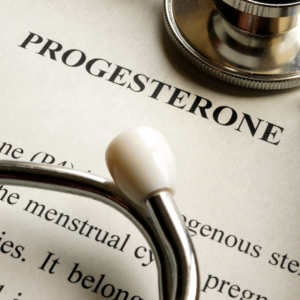(*NONE OF THIS IS MEANT TO BE MEDICALLY DIAGNOSITC. THIS IS FOR EDUCATIONAL PURPOSES ONLY. IF YOU FEEL LIKE YOU HAVE ANY OF THESE SYMPTOMS, PLEASE CONTACT YOUR MEDICAL PROFESSIONAL*)
I can’t tell you how many times I’ve heard or read some variation of the question:
“Why are my hormones all over the place?”
Many of us feel like our hormones are in complete chaos, and causing all sorts of problems in our body.
Believe me, I’ve felt that way too.
My goal in doing this is to educate and empower. I want you to understand what’s going on in your body, to have the information you need to make decisions or choices that you need to make, and to be able to know what changes to make to feel better.
Don’t worry, I’m not going to teach you about every single hormone in your body.
I am not an endocrinologist!
But I will teach you about the ones to watch out for, what to be aware of, and what you have the power to work on yourself!
The good news is that the approaches to work on for most of these are almost exactly the same! You’ll see why when we get into the details.
Today we’re going to dive into the specifics of progesterone, testosterone, and cortisol.
Last time we talked about estrogen, so make sure you have a look at that video.
Progesterone and testosterone are hormones that are found in everyone, just like estrogen. But progesterone goes along with estrogen and is higher in females, while testosterone is generally higher in males. So what does it look like when these hormones aren’t doing what they’re supposed to be doing?
Progesterone

Generally speaking, more people experience low progesterone than high progesterone. It is possible that progesterone can be high, but it’s not as common and doesn’t show up clinically, as much as low progesterone does. Progesterone is very tied to fertility, and low progesterone often goes hand in hand with fertility issues. Symptoms of low progesterone can include:
- General infertility
- Anovluation – this means that you haven’t ovulated during your cycle this month, which can be connected to fertility issues
- Polycystic ovarian syndrome (PCOS)
- History of miscarriages
- Prolonged or heavy periods
- Breast tenderness
- Breast cysts
- Uterine fibroids
- Ovarian cysts
- Hypothyroidism
- Low libido
How to optimize progesterone
- Soy, freshly ground flaxseed – these phytoestrogens will help to optimize progesterone as well. Specifically, 2 Tbsp of ground flaxseed every day is a great food to add for hormone optimization
- Stress management
- Blood sugar regulation, which will help keep insulin levels optimal
- Good sleep
- Ensuring adequate melatonin levels
Testosterone
Testosterone is found in both males and females, but is higher in males. All of the symptoms of high or low testosterone can be noticeable for both males and females as well.
Symptoms of high testosterone
- Polycystic ovarian syndrome (PCOS)
- PMS
- Lack of periods (amenorrhea)
- Miscarriages
- Acne
- Aggressive or risk-taking behaviours
- Excess body hair – on the face or anywhere on the body
- Headaches
- High sex drive
- Increased appetite
Symptoms of low testosterone
- Low libido
- Low energy
- Low motivation
- Depression
How to optimize testosterone
- Regular exercise
- Good blood sugar regulation
- Healthy fats – maybe even adding fish oil
- 2 Tbsp of flaxseed every day
- Eating seaweed
- Stress management!
- Regular exercise
- There are some supplements that can increase testosterone – have a chat with your ND about that to see which one would be best for you
Cortisol
Cortisol is a stress hormone that’s actually really important, but when levels are too high it isn’t good. Cortisol increases when stress levels in the body are high.
How are your stress levels today?
Here’s the thing about cortisol. All sex hormones – estrogen, progesterone, testosterone, cortisol, and others – come from the one main building block of cholesterol. But if stress levels are high, and a lot of cortisol is needed, that’s what all the cholesterol gets turned into. At the expense of all the other hormones. So when stress levels are really high for a long period of time, the body focuses on making cortisol rather than estrogen, progesterone, or testosterone. This is why high stress can have direct impacts on hormone levels.
Symptoms of high cortisol
These can all accompany prolonged periods of high stress.
- Hypothyroidism
- PMS
- PCOS
- Insulin resistance
- Metabolic syndrome
- Fat deposits around chest, abdomen, and head
- Lowered immune function (increased infection)
- High blood pressure
Symptoms of low cortisol
Having cortisol levels that are too low can be a dangerous medical condition and needs to be followed up on with your medical practitioner.
- Cravings for sugar, caffeine, alcohol
- Poor concentration
- Low blood pressure
- Increased skin pigmentation

How to Optimize All Hormones
Stress management – if you haven’t noticed it yet, stress management is tied to absolutely all hormones. Stress can throw every single hormone out of balance. Focusing on stress management is a very important lifestyle thing to focus on.
- Deep breathing, meditation, or mindfulness every day
- Daily exercise
- Good sleep
- Eat mostly whole foods
- Avoid caffeine and alcohol as much as possible
- Avoid sugar and junk food as much as possible
Ways to make sure all your hormones are optimized:
- Eat lots of vegetables
- Get good sleep
- Blood sugar regulation – eat mostly a whole foods diet
- Increase water intake
- Make sure to eat healthy fats – raw nuts and seeds, avocados, small fatty fish, extra virgin olive oil
- Eat lots of brassica vegetables – broccoli, cauliflower, Brussels sprouts, cabbage
- Limit caffeine and alcohol
As I’ve said before, to really optimize every hormone, good sleep is key. So if sleep is something you need to get control of, book your free Sleep Assessment Call here, where I can give you some feedback and get you started on sleeping well.
